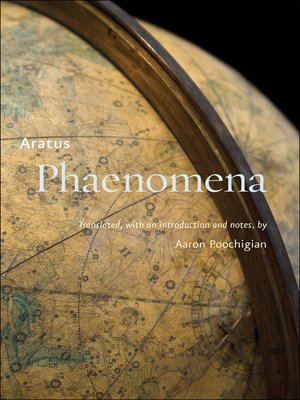Phaenomena
ebook ∣ Constellation Risings and Settings · Johns Hopkins New Translations from Antiquity
By Aratus

Sign up to save your library
With an OverDrive account, you can save your favorite libraries for at-a-glance information about availability. Find out more about OverDrive accounts.
Find this title in Libby, the library reading app by OverDrive.



Search for a digital library with this title
Title found at these libraries:
| Loading... |
After the Iliad and the Odyssey, the Phaenomena was the most widely read poem in the ancient world. Its fame was immediate. It was translated into Latin by Ovid and Cicero and quoted by St. Paul in the New Testament, and it was one of the few Greek poems translated into Arabic.
Aratus' Phaenomena is a didactic poem—a practical manual in verse that teaches the reader to identify constellations and predict weather. The poem also explains the relationship between celestial phenomena and such human affairs as agriculture and navigation.
Despite the historical and pedagogical importance of the poem, no English edition suitable for students and general readers has been available for decades. Aaron Poochigian's lively translation makes accessible one of the most influential poets of antiquity. Poochigian's interpretation of the Phaenomena reestablishes the ancient link between poetry and science and demonstrates that verse is an effective medium for instruction.
Featuring references to Classical mythology and science, star charts of the northern and southern skies, extensive notes, and an introduction to the work's stylistic features and literary reception, this dynamic work will appeal to students of Ancient Greece who want to deepen their understanding of the Classical world.






